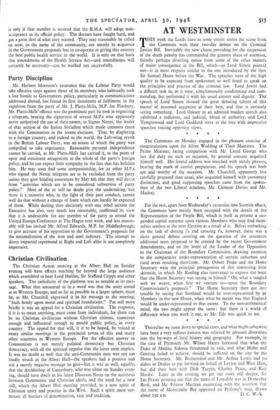AT WESTMINSTER
THIS week the Lords have to some extent stolen the scene from the Commons with their two-day debate on the Criminal Justice Bill. Inevitably the new clause providing for the suspension of the death penalty has commanded the greatest share of attention, thereby perhaps diverting notice from some of the other matters of major consequence in the Bill, which—as Lord Simon pointed out—is in most respects similar to the one introduced by the then Sir Samuel Hoare before the War. The speeches were of the high quality to be expected from spokesmen so well fitted to speak on the principles and practice of the criminal law. Lord Jowitt had a difficult task in, as it were, simultaneously condemning and com- mending, but performed it with his usual artistry and dignity. The speech of Lord Simon showed the great debating talents of this master of reasoned argument at their best, and that is certainly saying something. Lord Oaksey in an admired maiden speech also exhibited a judicious, and judicial, blend of authority, and Lord Templewood and Lord Goddard were to the fore with impressive speeches voicing opposing views.
* * * * The Commons on Monday engaged in the pleasant exercise of congratulations upon the Silver Wedding of Their Majesties. The Prime Minister, facing comparison with Mr. Lloyd George who last did duty on such an occasion, by general consent acquitted himself well. His formal address was matched with stately phrases, bearing the mark of careful preparation, and his speech was both apt and worthy of the occasion. Mr. Churchill, apparently less carefully prepared than usual, also acquitted himself with customary distinction, and good supporting speeches came from the spokes- men of the two Liberal echelons, Mr. Clement Davies and Mr. Mackay.
* * For the rest, apart from Wednesday's excursion into Scottish affairs, the Commons have mainly been occupied with the details of the Representation of the People Bill, which is itself at present a sus- pended capital sentence upon various Members who may find them- selves seatless at the next Election as a result of it. Before embarking on the task of dotting i's and crossing t's, however, there was a short general debate centring on the question of the seventeen additional seats proposed to be created by the recent Government Amendments, and on the letter of the Leader of the Opposition to the Chairman of the Boundary Commission, drawing attention to the comparative under-representation of certain suburban and rural areas resulting therefrom. Mr. Osbert Peake and the Home Secretary were the principal protagonists of this interesting little skirmish, in which Mr. Keeling also intervened to express the hope that the Home Secretary was saying to himself "Oh, what a tangled web we weave, when first we venture to—upset the Boundary Commissioner's proposals." The Home Secretary then got into trouble by saying that Scotland would be over-represented by gr Members in the new House, when what he meant was that England would be under-represented to that extent. To the non-arithmetical mind, the two might appear the same : but there is a world of difference when you work it out, as Mr. Ede was quick to see.
Thereafter we came down to special cases, and what might otherwise have been a very tedious process was relieved by pleasant diversions into the by-ways of local history and geography. For example, in the case of Plymouth Mr. Wilson Harris lamented that what the Duke of Medina Sidonia threatened in vain, and what Hitler and Goering failed to achieve, should be inflicted on the city by the Home Secretary. Mr. Bechervaise and Mr. Arthur Lewis had no dukes or Drakes to put forward on behalf of Leyton and West Ham, but did their best with Dick Turpin, Charley Peace, and Keir Hardie. Later in the evening we got our roots still deeper, Sir Ian Fraser pointing out that the name of Lonsdale was in Domesday Book, and Mr. Fitzroy Maclean countering with the assertion that the name of Morecambe Bay appeared on Ptolemy's map, drawn
about 150 A.D. D. C. W.-S.






























 Previous page
Previous page